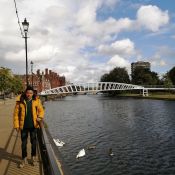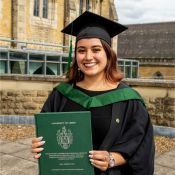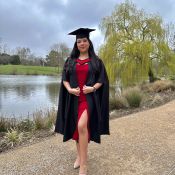
This is a dream experience
My name is Sara, I finished my master's degree in Human Anatomy at the University of Edinburgh. Since the first time I visited Scotland, I fell in love and have been looking for a way to study in this beautiful place ever since. Fortunately, I found Across the Pond and they guided me throughout my process to fulfill my dream. I finished my medical degree in Mexico and as soon as possible, I applied to do my master's degree in Edinburgh. I knew that this University was one of the pioneers in medicine and that if I wanted to continue my path to be a surgeon this was the right place.
Accommodation
At first, it was difficult to find a place to live, so I recommend you come 1 month before your master's degree begins so that you don't neglect your studies to find housing. It's a bit heavy, but 100% worth it.
The University of Edinburgh: A dream
At the University of Edinburgh, in the building where I studied, it is the dream of any medical student. She could literally study in the anatomy museum, surrounded by specimens dating back to the 13th century. The staff is prepared to give classes, something that does not happen in my country; normally in Mexico, it is doctors who give us classes, however, in Scotland they are first anatomists and they also have a bachelor's degree in some other health science (in my opinion a plus). My master's degree taught me both theoretical and practical knowledge and I achieved something I thought I would never do, writing a thesis.
Is my English knowledge enough?
I have to say that when I started my master's degree, my English was a C1 and now I have a high C2, I already understand a lot of UK accents (and yes, there are a lot). If what stops you from studying in the UK is English, don't worry little by little you will improve it and the staff is very patient with that issue because there are many students who come from abroad.
People are really nice
Something that made a big difference this year was the group of friends I made. We are 4 in total and come from different parts of the world such as the United States, England, and Iran, we toured Scotland and you can learn from the different cultures of all. In Mexico, I did not consider myself sociable, but in Edinburgh, it is so easy to talk to people and make friends that I can say that I became extroverted. You can literally make friends on the train, at the bus stop, in the supermarket, wherever...
A little glimpse into life in Edinburgh
Edinburgh is an excellent option if you want to get to know the current Scottish life surrounded by medieval, Victorian, and modern buildings (few), with the ease of public transport to go everywhere (bus, tram, taxis, airport). For me, it is the perfect city, it has the sea, first-class schools and hospitals, museums, festivals, markets, hotels, hostels, cinemas, shops, pubs, restaurants, clubs, a zoo and little else outside, the beautiful Scottish countries. If you like history and old buildings, but also enjoy the conveniences of modern life, Edinburgh is for you. In addition, you can experience the 4 seasons of the year, I was able to see the beautiful orange scenery in autumn, I was able to witness my first snowfall, cherry blossom trees in spring, and swimming in the sea in summer.
This is your moment
I highly recommend the Human Anatomy master's degree at the University of Edinburgh if you need to learn or reinforce your knowledge of anatomy. The staff is very capable and the learning tools they offer are invaluable. This is a dream experience worth investing your effort and other resources into. You are very close, do not give up.
- Sara

I highly recommend living an academic experience in the United Kingdom
Hello, my name is Alan, proudly Mexican, I graduated as a mechatronic engineer, and since high school I wanted to have an international experience.
That's finally achieved!
Thanks to social networks I found a post from Across the Pond, I asked them some general questions, they motivated me to start the process and without further ado this new experience began.
As I was thinking of continuing my academic development focused on robotics, I managed to find the University of York, which has a specialized laboratory on the subject as well as professors who have been awarded for their achievements in the area. At first, I was worried about my decision, but I ended up realizing that things happen for a reason, and that is that I ended up more than happy to have studied at this UK university.
It is notorious at the university, and I can tell you that it left me with a very good feeling that 100% of the professors who taught me had a vocation for teaching, which is something that left a great mark on me. I feel that they not only developed me academically, but also personally, in addition to the fact that this opened many doors for me to be able to practice my profession.
Social life at the university and in the city is very easy, since the vast majority are foreigners and socializing become something natural. I would venture to say that most are more receptive, they want to help you and include you in their social circle.
As you can see from the name of the university, I lived in the walled city, York, this city has something special, totally recommendable to live, you can get everywhere on foot, the history of the city surrounds you, it never gets tedious, there are many people there that you can meet and that will leave something good in your life. I can assure you that this city fully met my expectations.
I would like to mention the issue of accommodation because it is something challenging that most experience, and the solution is to look for it in advance, there are many options, some very close to the university and in other locations you only must take a short walk. There is a wide range of prices, my situation was very particular since I traveled with my wife, and as I already mentioned, it is something that can be solved by searching in advance.
In conclusion, I highly recommend living an academic experience in the United Kingdom, not everything can be explained in words what you have to experience, it is something that I feel proud and happy to have done.
- Alan

My Cranfield experience
My Cranfield journey has been one of the most enriching and valuable experiences I have lived so far. Something that one day seemed unreachable and beyond my expectations, became true.
Everything started with the idea of becoming a more prepared professional, throughout the tools, resources and experience that a master’s degree offers, specially in another country, that allowed me to make an impact in my community and be a positive influence for others.
During my research, at the beginning of the process, I realized that UK was among the countries with better rankings for financial masters, offering a wide variety of programmes and resources that fitted with what I was looking for to continue my personal and professional development.
I have to admit, that the process was not easy at all, but what I can assure, is that it totally worth it. During each of the steps that I was required to complete, and for all the information and queries that arise throughout the whole process, scholarships, documents, interviews, etc. Across the Pond offered me their support, which made everything much easier, compared with what would have been without their aid.
Once I arrived to UK, a whole new world was disclosed for me, discovering new customs, cultures, lifestyle, food, weather, etc. Furthermore, >80% of my classmates were from other parts of the world, outside UK, which made the master more insightful, since it helps you to develop a broader vision, mindsets and learning to work with multicultural teams.
There are countless of memories that I most remember and appreciate, including all the friendships, trips, hangouts, social activities both inside and outside the University, football games, professors, classes, teamwork projects, exams, seminars, thesis, etc. It was like living again old times in a very short period of time, trying to take the fullest advantage of each day.
Something that I found really interesting during that time, was having a closer understanding of the different cultures around the world. Some actions that for one person can be natural and part of their daily life, for other cultures might not be interpreted the same. Among all the activities the University organize, I remember one called “the international week”, where different students from their respective countries coordinate for showing others some of their most traditional dishes, customs, clothes, and anything else that represents them. In my case, we prepared some “tacos of cochinita pibil” (or at least we made our greatest effort for that), being a wonderful experience not only showing others part of your own culture, but also learning from others part of them, beyond of what we can learn from any books or videos.
Finally, what I learnt during that time, was that a master’s degree is not the end of the road, there’s a whole world outside, always something new to learn, and that anything that challenge your comfort zone, will always worth the effort.
- Miguel

Giving me the chance to be a beginner again…
It's no secret that getting out of your comfort zone is not an easy process and when I moved to England to start my university life, it was more complicated than I thought.
My dream as a child was always to become an actress or a Tae Kwon Do world champion, but for some reasons, my career as an athlete did not bear fruit. So, I decided to follow my other dream, and what I am studying is "Acting and stage combat”. When I read the name of the career I fell in love because it was like putting together my two dreams, Tae Kwon Do and acting. This career is basically acting, but they also teach you the basics concepts of safety to act in a fight without hurting your teammates, you also learn to handle different weapon systems such as swords, knives, shields, firearms or just your own body for unarmed fights.
The selection of the university was relatively simple, since the University of Essex (East 15 Acting School) was the only one in the world that offered the degree I wanted, so we can say that I did not have many options.
I'm not going to lie I would have loved this degree to be here in Mexico or at least in a country with a Spanish-speaking language. I really did not want to leave, I am a person very attached to my roots, to my family, to mexican food, I love the sun, and on top of that, I’m shy and without the best English (literally I got the minimum qualification to enter university).
I am grateful of that day that I took the flight to London and even though there have been times when I felt very alone, what I have gained from this experience has been much more, especially personal-wise. If we talk about academics, my English is still not the best, but it has improved significantly, I can say that two of my teachers have been the best teachers I have ever had and I have learned to manage the money. But personal growth has surpassed academics, I have learned a lot from myself, and it has made me have to overcome challenges, thus giving me the necessary confidence to trust in my problem-solving abilities.
My advice to you is to give yourself the opportunity to be a beginner again, you will have to find new favourite places, new restaurants, new ways of comfort, even new food products when you go to the supermarket! And if you're not fluent in English and you're a shy person like me, it'll probably cost you a bit more, but once we learn in this life to be comfortable with the unknown, we'll be unstoppable in any field.
THINGS I WOULD HAVE LOVED TO KNOW BEFORE I LEAVE…
- Meeting Across the Pond before: I arrived a week late for my classes because the university had not given me a document that I needed to apply for my visa, but I met Across the Pond and they speeded the process, so if it wasn’t for them, I would have been a month late. They are very helpful and friendly, also it is always good to have someone who is guiding you in the process and to whom you can ask all the doubts that arise.
- Your English doesn't need to be the best to survive: The truth is that people are very patient and kind and have no problem with helping, so don't be afraid to ask. With my basic English I survived the train, airports, supermarkets, school services, etc.
- Take your favourite seasonings with you: There are certain seasonings that you will not find in the new country, or maybe they are from the same brand, but they will not taste the same. If they are fundamental to you, I really recommend you to bring them, for example, I filled my suitcase with spicy sweets and sauces.
- Accommodation: There are some student residences that offer three-year contracts and give you a discount for that. However, I recommend that you also take the option of living the first year in the student residence, meeting people and then moving out to a house with your same classmates and it will be much cheaper. Or rent an Airbnb for a month and then find a place to live.
- Clothing: Winter clothes are better to buy here, they are better prepared and probably with more quality.
- Airports: Keep in mind that some airlines if you buy a round trip and you miss the first flight, you also lose the return flight. So you can also evaluate the option of buying the flights separately or talk with the airline to see if they let you to take just the return flight.
- Banks: There are some places that only accept English cards for any deposits or payments. The Revolut bank can help you to get a British card fast and easy to process it, literally all the process is from your phone.
- Internet package: Something that helped me a lot was having internet on my phone to use Google translator, directions on Google Maps, to get ubers or taxis. I use Voxi because I can pay with my Mexican card without any problem and the price is very reasonable.
Good luck guys and enjoy your new experience! ?
- Daniela

Outstanding Academic Experience
Having attended a British school in Mexico City from the age of 2, it had always been my dream to one day live in the UK. When I was in high school browsing sustainability-related undergraduate courses, I came across Environment and Business in Leeds. It seemed like the perfect course for me, and after doing more research I fell in love with Leeds as a city too. It certainly did not disappoint! I have thoroughly enjoyed my academic journey at the university; from the engaging lectures, to the challenging assignments. The interactive and dynamic learning/teaching environment we have here is quite different from the more traditional teaching in Mexican schools and universities. My favourite thing about studying in Leeds is that I have been able to take various modules that cover a wide range of subjects, including modules such as Sustainable Development, Environmental Politics and Policy, Economics and Sustainability, Social Ecological Systems, People, Sustainability and the Environment, and Strategic Energy Issues.
Fun Student Life
I have not only enjoyed my academic life, but also the day to day. Leeds is a beautiful city, with hundreds of things to do, I have never been bored for a day! It is full of delicious restaurants, bars, nightclubs, shopping centres, parks, cinemas, and much more. Coming from such a big city, Leeds seemed like a very small place, but I had nothing to worry about. In fact, I really like how different the lifestyle is here. Having access to safe and reliable public transport, easily visiting nearby towns and cities on train, being able to walk pretty much anywhere I need to go. Student accommodation has also added to my student experience, and is one of the biggest differences I find between being here and living at home. In my first year I lived in university residences, which was such a fun experience! I met all the people who, still today, are my best friends and helped me get adjusted to British culture and introduced me to some of their friends as well. After that, in my second and third years I lived with friends in private accommodation in a popular student area called Hyde Park. This allowed me to become much more independent and responsible, and to truly experience what it is like to live on my own.
Diverse Welcoming City
From day one, everyone in Leeds has made me feel welcome. From students and lecturers to random people on the street, everyone here is polite and kind, always willing to lend a helping hand if you’re in trouble. Especially as international students, people understand we might experience a few extra struggles when we first move in, and they are therefore very supportive. Both the city and the university are very diverse; we have students from over a hundred different countries! I have made friends here not only from the United Kingdom, but also from Japan, India, Indonesia, Pakistan, Saudi Arabia, Mexico, Ecuador, Spain, France and Kenya, to name a few. This has allowed me to learn about and appreciate different cultures, lifestyles, foods, traditions, and also to share my own!
- Almudena





